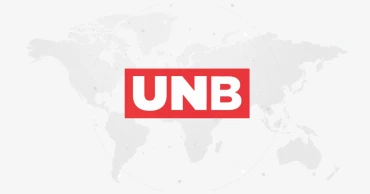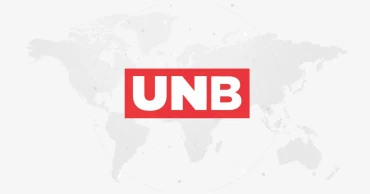West
Russian prime minister says pressure from West is strengthening ties with China
Pressure from the West is strengthening Russia's ties with China, Russian Prime Minister Mikhail Mishustin said in a meeting with his Chinese counterpart in Beijing Wednesday.
Mishustin's visit comes as Russia is increasingly turning to China for diplomatic and economic support amid growing isolation over its invasion of Ukraine.
Also Read: G7 urges China to press Russia to end war in Ukraine, respect Taiwan's status, fair trade rules
In opening remarks at his meeting Wednesday with Chinese Premier Li Qiang, Mishustin did not mention the 15-month-old war that China, in deference to Moscow, has refused to criticize, focusing instead on economic cooperation between the neighbors that have partnered in challenging the U.S. lead in global affairs.
Relations between the two countries are "at an unprecedented high level," influenced by the "increased turbulence in the international arena and the pattern of sensational pressure from the collective West," Mishustin said.
Also Read; New sanctions: How effective are they in stopping Russia's invasion of Ukraine?
China says it is a neutral party between Russia and Ukraine and wants to help broker an end to the conflict. But it has blamed the West for provoking Moscow and has maintained strong diplomatic and trade ties with Russia in opposition to sanctions against it.
China's special envoy met with Ukrainian President Volodymyr Zelenskyy and other government officials during talks in Kyiv this month. The visit followed a phone call last month between the Ukrainian leader and his Chinese counterpart Xi Jinping that Zelenskyy described as "long and meaningful" and which marked the first known contact between the two since the Russian invasion began.
Also Read: The cyber gulag: How Russia tracks, censors and controls its citizens
Beijing released a peace plan in February but Ukraine's allies largely dismissed it, insisting that Putin must withdraw his forces. Zelenskyy's own 10-point peace plan includes a tribunal to prosecute war crimes committed by Russia.
While sidestepping the conflict, Mishustin emphasized Russia's role as a provider of oil and gas to China and their bonds formed as initial allies among communist nations.
"The peoples of Russia and China cherish their history, rich culture and traditions. We support the further development of our culture, exchanges and communication," Mishustin said.
2 years ago
Palestinian teen killed in Israeli army raid in West Bank
Israeli forces shot and killed a Palestinian teenager Tuesday during an army raid in a refugee camp in the northern West Bank, Palestinian officials said.
The death was the latest in an almost year-long surge in Israeli-Palestinian violence that shows no signs of abating.
Meanwhile, in the southern West Bank city of Hebron, a video captured by an American journalist showing an Israeli soldier shoving a Palestinian activist to the ground and then kicking him caused an uproar online — prompting the Israeli military to jail the soldier for 10 days.
Early on Tuesday, the Israeli military said it carried out raids across the occupied West Bank overnight. During an operation in the Faraa refugee camp near the northeastern city of Tubas, the army said it opened fire on a Palestinian who approached troops with an explosive device. The camp is home to a recently formed militant cell affiliated with Palestinian Islamic Jihad, an Islamist group.
The Palestinian Health Ministry said that 17-year-old Mahmoud al-Aydi died from a bullet wound to the head. No militant group immediately claimed him as a member.
Also on Tuesday, a 25-year-old Palestinian succumbed to wounds he suffered two years ago when the Israeli army shot him in Masafer Yatta, in the southern West Bank, leaving him paralyzed from the neck down.
Palestinian health officials identified him as Haroun Abu Aram. Footage from the incident in 2021 showed him struggling to prevent Israeli security forces from confiscating his portable generator before a shot rang out, and he collapsed.
Tensions have mounted for months as Israel has escalated arrest raids in the West Bank, which were prompted by a spate of Palestinian attacks on Israelis last spring. Some 30 people were killed in Israel by Palestinians in 2022, and at least 12 others died in attacks so far in 2023.
An Israeli Border Police officer died Monday after he was stabbed by a Palestinian teen in east Jerusalem. A security guard opened fire at the assailant, but police say he also wound up shooting and critically wounding 1st Sgt. Asil Su'ad. A Bedouin Arab serving in Israel's paramilitary police force, Su’ad was to be laid to rest in northern Israel on Tuesday.
In Hebron, prominent Palestinian activist Issa Amro was giving an interview to Lawrence Wright of The New Yorker magazine on Monday when an Israeli soldier grabbed Amro by the neck as if to choke him before throwing him onto a brick sidewalk, footage posted by Wright on Twitter showed. The soldier kicked Amro as he lay on the ground and began to drag him on the concrete before another soldier intervened, pulling him away from Amro.
Late on Monday, the Israeli army said the soldier would serve 10 days in military prison and be suspended from active combat duty, adding, “As the video shows, the soldier did not act as expected and did not follow the (military's) code of conduct."
Palestinian and human rights groups accuse the Israeli military of frequently using excessive force and say soldiers are rarely punished for violent acts. Even in the most shocking cases — and those captured on video — soldiers often get relatively light sentences.
Yet Israel's ultranationalist National Security Minister Itamar Ben-Gvir lambasted the punishment as a “disgrace.” He has long called for a relaxation of open-fire regulations and immunity from criminal prosecution for members of the security forces acting in combat situations in the West Bank.
“Soldiers deserve to be backed up, not jailed,” Ben-Gvir wrote on Twitter.
Nearly 150 Palestinians were killed last year in the West Bank and east Jerusalem, making it the deadliest year in those areas since 2004, according to figures by the Israeli rights group B’Tselem. At least 48 Palestinians have been killed by Israeli troops since the start of this year.
Israel says that most of those killed have been militants but others — including youths protesting the incursions and other people not involved in confrontations — have also been killed.
Israel says the military raids are meant to dismantle militant networks and thwart future attacks while the Palestinians view them as further entrenchment of Israel’s open-ended, 55-year occupation.
Israel captured the West Bank, east Jerusalem and the Gaza Strip in the 1967 Mideast war, territories the Palestinians claim for their hoped-for independent state.
3 years ago
Ruble dives, stocks sink as West tightens Russia sanctions
The ruble plunged to a record low of less than 1 U.S. cent and most global stock markets declined Monday after Western nations moved to block some Russian banks from a global payments system.
Russia’s invasion of Ukraine has caused markets to swing wildly, given the potential impact on inflation, energy supplies and other economic repercussions.
Putin's order that Russian nuclear weapons stand at increased readiness to launch ratcheted up tensions with Europe and the United States and revived dormant fears from the Cold War era.
The Russian central bank raised its key rate to 20% from 9.5% in a desperate attempt to shore up the plummeting ruble and prevent a run on banks. That brought a temporary reprieve for the Russian currency, which bounced back to the level it was at last week, but only briefly.
Also read: Asian shares, US futures fall as Ukraine conflict deepens
The ruble has plunged more than 30% after the move to block Russian banks from the SWIFT payments system. The sanctions include restrictions meant to crimp the Russian central bank’s access to over $600 billion in reserves and hinder its ability to support the ruble.
A weaker ruble is expected to cause inflation to surge, potentially angering Russians whose budgets will be stretched by soaring prices. It will also add to strains across Russia's financial systems.
Germany's DAX fell 2.1% to 14,263.95 and the CAC 40 in Paris lost 2.3% to 6,595.83. Britain's FTSE 100 shed 1.7% to 7,365.29.
In New York, the future for the S&P 500 was 1.6% lower and that for the Dow industrials declined 1.3%.
Also read: World shares up, US futures sink as Russia moves toward Kyiv
On Friday, the S&P 500 climbed 2.2%, notching its first weekly gain in three weeks. The Dow Jones Industrial Average rose 2.5% and the Nasdaq composite gained 1.6%. The Russell 2000 index rose 2.3%.
The end of the month usually brings a raft of economic data, but for now the conflict is eclipsing other issues.
“It’s all about the Russia-Ukraine situation and evolutions in that situation will drive market sentiment and direction,” Jeffrey Halley of Oanda said in a commentary.
“President Putin will now have to accept that the ‘Western’ powers are prepared to accept quite a bit of economic pain now to punish Russia,” he said.
Markets in Asia appeared to take the latest developments more calmly.
Japan's Nikkei 225 index recovered from earlier losses to edge 0.2% higher to 26,526.82. The Hang Seng in Hong Kong lost 0.2% to 22,713.02. The Shanghai Composite index gained 0.3% to 3,462.31. The Kospi in Seoul climbed 0.8% to 2,699.18, while in Sydney the S&P/ASX 200 gained 0.7% to 7,049.10.
Although Asia is unlikely to suffer direct damage from the war in Ukraine, higher energy prices are an unwelcome burden for oil-importing nations like Japan, especially while they are still struggling to recover from the pandemic.
Underscoring deepening rifts due to the conflict, BP said Sunday it was exiting its 19.75% share in Rosneft, a state-controlled Russian oil and gas company, which it has held since 2013. That stake is currently valued at $14 billion.
Oil prices surged Monday, with U.S. benchmark crude up $4.33, or 4.7%, at $95.92 per barrel in electronic trading on the New York Mercantile Exchange. It lost $1.22 to 91.59 per barrel on Friday.
Brent crude gained $4.20 to $98.32 per barrel, up 4.5% and approaching the $100 per barrel level it breached last week.
The Ukraine conflict has heaped uncertainty atop other worries over interest rates and inflation.
The U.S. Federal Reserve has suggested it will raise short-term interest rates next month by double its usual increase, the first rate increase since 2018. Higher U.S. rates tend to put downward pressure on all kinds of investments, and can have global repercussions.
In currency trading, the U.S. dollar inched down to 115.61 Japanese yen from 115.77 yen. The euro rose to $1.1165 from $1.1157.
4 years ago




